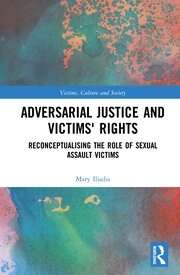Research aims to enhance justice experience of sexual violence victims

Deakin University criminologist Dr. Mary Iliadis has uncovered more meaningful ways to include sexual violence victims in criminal justice systems. Her research has been extensively consulted in the lead-up to the development of policy reforms in Northern Ireland. (Content Warning: discussions of sexual violence in court proceedings and criminal justice systems generally.)
The research of Dr. Mary Iliadis, co-convenor of the Deakin Research on Violence Against Women (DRVAW) Hub, has been recognized and cited in Northern Ireland's Gillen Review into the Laws and Procedures in Serious Sexual Offences.
The chair of the review, Sir John Gillen—a retired Judge of Belfast's High Court—described Dr. Iliadis's research as "absolutely invaluable, serving to inform the Advisory Board's views on this issue [sexual history evidence] in a manner that otherwise would not have been possible."
The influential report of the Gillen Review led to the development of a pilot project in Northern Ireland to introduce independent legal representation for victims whose sexual history evidence is subpoenaed in criminal trials.
In Australia, just under 30 percent of sexual assault reports lead to an arrest, summons, formal caution or other legal action. It is important to acknowledge that not all victims choose to come forward. In fact, current reporting rates are a significant underestimate of the gravity and extent of sexual victimization within Australia, and indeed globally.
In an effort to reconceptualise victims from "witnesses" to "participants," Dr. Iliadis attests that if victims do decide to report a crime, they should be given opportunities to meaningfully participate.
"My research helped to shed light on how we might consider introducing victims' rights without compromising the ways in which the current legal system operates," Dr. Iliadis said.
In Australian criminal justice systems, sexual violence victims have a limited opportunity to participate. They can provide a victim impact statement, but only if there is a guilty verdict. Significantly, this is because victims are considered to be "complainants" bringing forward a complaint of an alleged sexual violence to which they are a witness in the criminal proceeding.
In her recent book, "Adversarial justice and victims' rights: Reconceptualising the role of sexual assault victims," Dr. Iliadis seeks to address how we can better acknowledge victims and their rights in a criminal justice system that has historically excluded victims.
"Sexual violence victims feel so silenced within our legal system because, beyond the victim statement, they aren't given the opportunity to relay their version of events in a way that suits them or reflects their story and the impact of the crime upon them," Dr. Iliadis said.
Her study investigated victim-focused reforms across England, Wales, Ireland and Australia to explore the extent to which reforms that offer victims enhanced rights to information and participation meet their procedural justice needs. In this study she also examined whether there is scope and merit in introducing independent legal counsel in adversarial justice systems, including within Victoria's criminal prosecution processes.
Her research has revealed the value of using a "triangulation of interests" framework that acknowledges the defense, the prosecution who represent public interest and the victim. Dr. Iliadis explains: "Let's think about the adversarial system as a triangle connecting the defendant, the prosecutor and, importantly, the victim and their voice.
"To enhance how victims experience the justice system, we need to be asking: How can we give victims more of a meaningful voice? How can we enhance prospects for information? How can we enable participation? How can they [victims] still feel validated even if a guilty outcome is not reached? How can they [victims] exercise control over those proceedings?"
Dr. Iliadis' research is highly relevant for the transfer of knowledge and practice in international jurisdictions that employ adversarial legal systems. In fact, her research on the Victims' Right to Review reform in England was cited extensively in the Victorian Law Reform Commission's report on The Role of Victims of Crime in the Criminal Trial Process.
Her work in Ireland has also been engaged with by the victim support sector in Australia to inform the development of proposals to extend the remit of separate legal representation offered to victims in limited circumstances in Queensland.
"It is absolutely critical that we continue to consult with those impacted by the laws and policies that we're contemplating, like victim-survivors," Dr. Iliadis said.
"This research is about measured, evidence-based and concise incremental steps to advance victims' involvement and level of contribution in a way that safeguards their needs and interests and allows them to contribute meaningfully to the case without further complicating or compromising the criminal trial process."
Provided by Deakin University





















